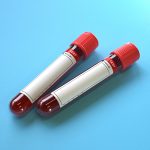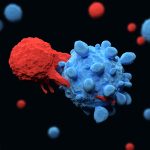-
January 19: The Week in Cancer News
Preventive gastrectomy has lasting effects, and rising cancer incidence undercuts continued progress against mortality.
by Eric Fitzsimmons
-
January 12: The Week in Cancer News
Hiding serious illness can be a coping strategy, and cancer rates are on the rise among young people.
by Kevin McLaughlin
-
January 5: The Week in Cancer News
The FDA will review a blood test that detects colon cancer, and a writer recounts his sister’s decision to receive medical aid in dying.
by Marci A. Landsmann
-
December 15: The Week in Cancer News
Study finds breast cancer survivors can opt for less frequent screening, and people with physical disabilities often encounter discrimination in cancer care.
by Thomas Celona
-
December 8: The Week in Cancer News
Less radiation explored in multiple studies at San Antonio Breast Cancer Symposium, and National Cancer Institute writes next precision medicine chapter.
by Marci A. Landsmann
-
December 1: The Week in Cancer News
FDA announces investigation into CAR T-cell therapy, and precision therapies are not available for most cancer diagnoses.
by Kevin McLaughlin
-
November 17: The Week in Cancer News
Study finds association between vitamin D levels and risk for peripheral neuropathy, and new report highlights rising lung cancer survival.
by Thomas Celona
-
November 10: The Week in Cancer News
Sun exposure is an occupational hazard around the globe, and a dormant virus can cause immunotherapy complications.
by Eric Fitzsimmons
-
November 3: The Week in Cancer News
Recommendation suggests ongoing lung cancer screening for those with heavy smoking history even after quitting, and children with Down syndrome and leukemia face worse outcomes.
by Marci A. Landsmann
-
October 27: The Week in Cancer News
Living alone may increase the risk of cancer death, and cervical cancer study results called ‘remarkable.’
by Kevin McLaughlin
Cancer Talk
Treatment Combination Improves Survival in EGFR-positive Lung Cancer
Adding chemotherapy to targeted therapy improves outcomes for people with advanced EGFR-positive non-small cell lung cancer.
by Sandra Gordon
Lessons From 20 Years Living With CancerMultiple myeloma survivor Jonathan Gluck reflects on uncertainty, and the scientific progress that has kept him living with cancer for more than two decades.
by Eric Fitzsimmons
The Enduring Importance of Cancer Disparities ResearchOpening session from AACR conference highlights how perseverance and adversity have informed cancer disparities research over the years.
by Eric Fitzsimmons
Most Cancer Survivors Don’t Meet Healthy Diet GoalsDespite research linking fruits and vegetables to cancer survival, many people do not change their eating habits after diagnosis.
by Darlene Dobkowski














